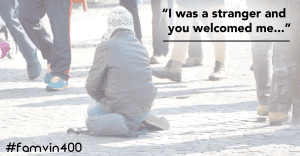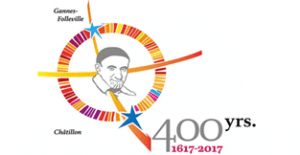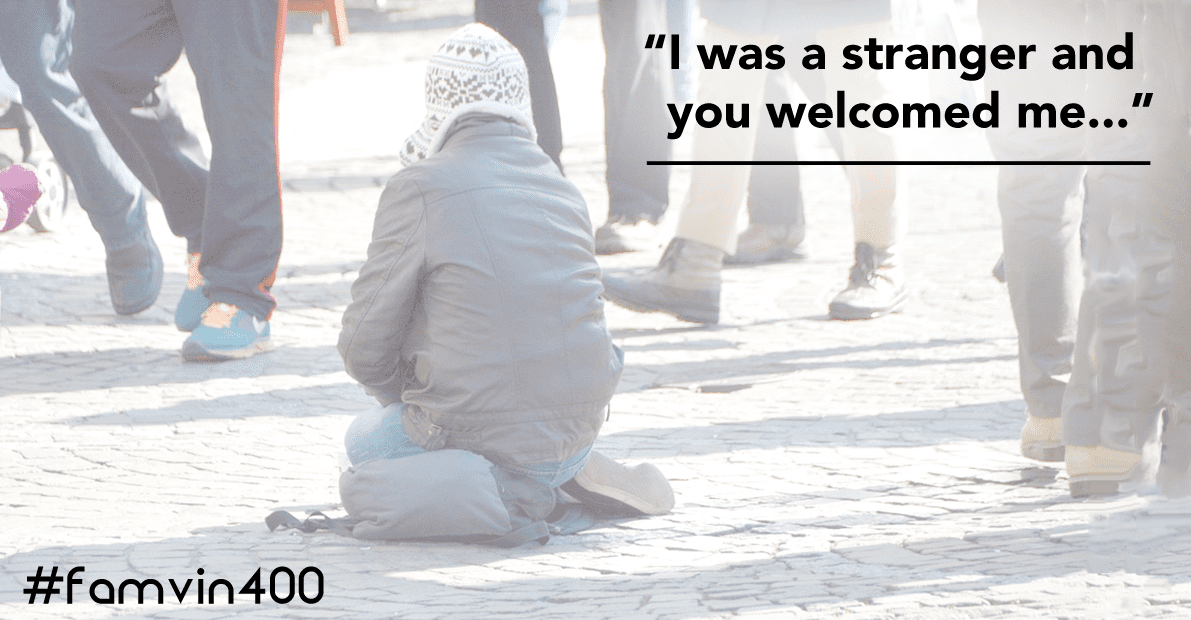“I was a stranger and you welcomed me”
A few events in 1617 touched the life of St. Vincent de Paul radically. The first event took place in the month of January. St. Vincent was asked to hear the confession of a dying man on the De Gondi Estate. After receiving the Sacrament of Reconciliation he made the following remark: “If not for Vincent’s pastoral care, I would have died in mortal sin.” These words touched St. Vincent and suddenly it made him to realize that there were tens of thousands just like him. This experience made him to accept the request by Madame De Gondi to preach a mission for her  employees, the poor peasants, on the need of General Confession at Folleville. This was the next event that took place on January 25. He instructed them, he moved their hearts and encouraged them to approach for general confession. Later St. Vincent himself realized what had happened and by way of summary he stated: “He [God] blessed what I said …. ” (CCD: XI: 4). So many people came forward to confess their sins that St. Vincent had to request the assistance of the Jesuits in Amiens. Yet another event took place in the month of August (20). During the Sunday Mass, St. Vincent called on his parishioners to help a sick family in great need. Many women responded that same afternoon, visiting the family and bringing them aid. Three days later, on 23rd August 1617, marveling at such generosity, and feeling it necessary to organize this help to make it more effective and long-lasting, St. Vincent led a first group of women to form a confraternity, with the aim of providing spiritual and material help to those most in need.
employees, the poor peasants, on the need of General Confession at Folleville. This was the next event that took place on January 25. He instructed them, he moved their hearts and encouraged them to approach for general confession. Later St. Vincent himself realized what had happened and by way of summary he stated: “He [God] blessed what I said …. ” (CCD: XI: 4). So many people came forward to confess their sins that St. Vincent had to request the assistance of the Jesuits in Amiens. Yet another event took place in the month of August (20). During the Sunday Mass, St. Vincent called on his parishioners to help a sick family in great need. Many women responded that same afternoon, visiting the family and bringing them aid. Three days later, on 23rd August 1617, marveling at such generosity, and feeling it necessary to organize this help to make it more effective and long-lasting, St. Vincent led a first group of women to form a confraternity, with the aim of providing spiritual and material help to those most in need.
These events revealed to him that he had been gifted with a unique grace from the Holy Spirit and God had a plan for him. Further, a few Gospel passages such as Luke 4: 18, Mt 25: 35 etc., enthused him to realize that he is called to imitate Christ the evangeliser of the poor. Serving the poor spiritually and corporally became the core of his life and mission. This is the beginning of the Vincentian Charism in the Church. A Charism is alive and relevant when through time it is accepted and adopted by many people. The “Vincentian Charism” has proven to be this kind of charism as it inspired numerous followers through these years. To this day it continues to be embraced, adopted and lived by numerous groups, associations, societies, institutes and movements. Today more than two million members appreciate and live Vincentian Charism around the Globe. It is worth to note that, of the total number of Vincentians, one hundred thousand (100000) members hail from India. What unites and brings us together is the one mission of loving and serving those persons living in various forms of poverty and marginalization.
In order to commemorate the 400th anniversary of the origin of the Vincentian Charism, we have a beautiful theme for this year 2017: “I was a stranger…you welcomed me” (Mt 25: 35). Vincentians around the world are called to seek and find out who are the strangers for them and take apt steps to welcome them. A few questions are posed before us to reflect, such as: Who are the strangers in our midst? How are we currently supporting them? What new needs are emerging? How might we respond to these needs?
In our to endeavour to answer these questions it is worth to reflect as how St. Vincent welcomed the stranger….the poor? What steps he took? What can we learn from him? The following are the some of the common steps that St. Vincent had taken in welcoming the stranger… the poor:
- He noticed the need like the Good Samaritan (Lk 10: 33). He set his eyes to see all those who were poor and found time to listen to them with keen interest.
- He was moved with pity and compassion. This made up his mind to do something concretely to change the lives of the poor. In other words his affective love became effective and contagious.
- He saw Christ in the poor and poor in Christ. Therefore with great respect he served them. He respected the poor as a person created in the image and likeness of God. This led him to consider the poor as his lord and master. Therefore, the service that he rendered was qualitatively par excellence.
- He had a clear vision and mission for the integral development of the poor. This made him to undertake both corporal and spiritual needs of the poor.
- He believed in collaboration. He brought together people of good will and together with them he worked so the end result of his services was more effective.
- He motivated others by way of advocacy and networking, by which he got a formidable force to serve among the poor and the needy.
- Finally not only he responded with the immediate relief but also tried to uproot the causes of poverty. For he believed the maxim: “charity seeks to remedy today what justice could have prevented yesterday”
The hunger report of 2015 reveals that 795 million people in world remain hungry. It is sad to note that India has the highest number of people (194.6 million) remain hungry. Lack of basic needs of life is still a serious setback in India. Are they not strangers who deserve welcoming? In India we have so many ‘strangers’. Yes, there are so many to choose from – the refugees fleeing from religious persecution, the migrants seeking a new life outside their own Federal States, the homeless, sexually exploited ones, drug addicts, the unemployed and underemployed, those coping alone with physical or mental illness, those suffering discrimination and exploitation perhaps because of their faith or race or color, the lonely and vulnerable both young and old, those deprived of quality education, etc. Many of these people and issues are already familiar to us and we have been doing relief works. However, can we do more? Why the number of these ‘strangers’ in steady growth instead of diminishing?
 This calls us to change the strategy that we were applying so far. If we really love the poor and want to arrest the poverty, we need to replicate the steps taken by St. Vincent. Our existence and identity as Vincentians will have a real meaning when we respond together to address the shocking issues in and around our society. Let this year of ‘Welcoming the Stranger’ be an opportunity to think together and work together as members of one family for the noble cause of alleviating or even eradicating poverty from the face of the earth.
This calls us to change the strategy that we were applying so far. If we really love the poor and want to arrest the poverty, we need to replicate the steps taken by St. Vincent. Our existence and identity as Vincentians will have a real meaning when we respond together to address the shocking issues in and around our society. Let this year of ‘Welcoming the Stranger’ be an opportunity to think together and work together as members of one family for the noble cause of alleviating or even eradicating poverty from the face of the earth.
Tags: 400th Anniversary, India, Welcoming the stranger



